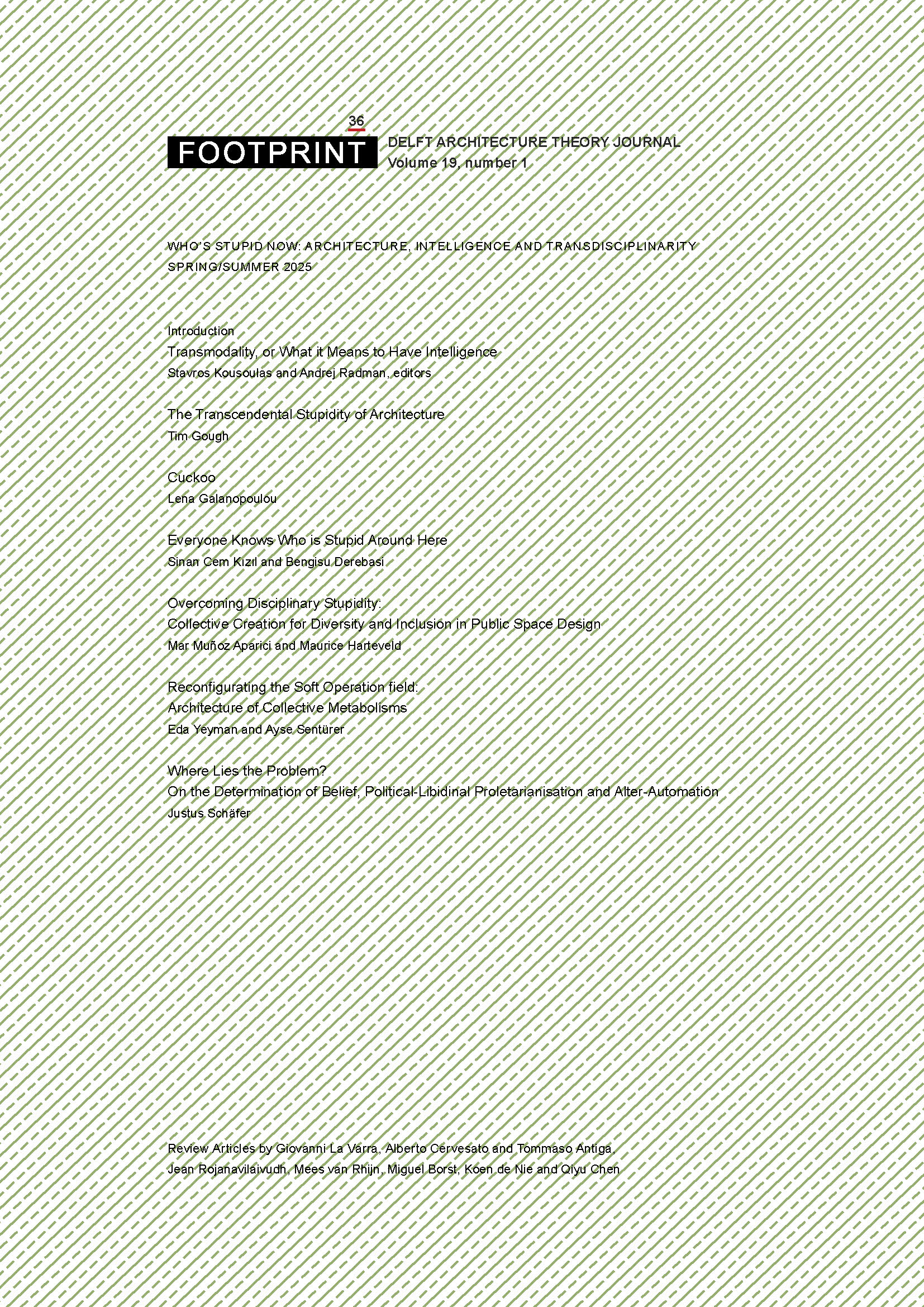Where Lies the Problem?
On the Determination of Belief, Political-Libidinal Proletarianisation and Alter-Automation
DOI:
https://doi.org/10.59490/footprint.19.1.7863Abstract
The article addresses the relationality of automation and the political-libidinal literacy of citizens. After contextualising the problem of reactive subjectivity in the Global Northwest of a perpetuating Enlightenment dialectics, the role of technology in the political-libidinal mereology is revaluated. Drawing from Bernard Stiegler’s notion of tertial retention and Gregory Bateson’s cybernetic theory, the milieu is reconstituted as a plane of transversal desire production and collective anticipation. In times of intensifying multiscalar automation, a lacking attunement to surroundings and responsibility, and general proletarianisation, the article argues for the localisation and sense-ablisation of problems to produce didactic environments for trans-individuative politics. Drawing from an ethics of care as a relational mode of thinking-acting, acts of maintenance are investigated in their potential to modulate the increasing imbalance of investment and passivity in urban subjects to foster de-proletarianisation. Drawing from Deleuze and Guattari’s schizoanalysis, processes of un-doing and re-doing are argued to deterritorialise and schizophrenise over-concretised automatons, opening up material conditions to participatory, creative appropriation and repair (collectively referred to as ‘alter automation‘) to reintroduce critical reflection and political negotiation into our milieus.
References
Alÿs, Francis. ‘Sometimes Doing is Undoing and Sometimes Undoing is Doing.’ Video artwork, 2013. https://francisalys.com/sometimes-doing-is-undoing-and-sometimes-undoing-is-doing/.
Arendt, Hannah. Eichmann in Jerusalem: A report on the Banality of Evil. New York: Viking Press, 1963.
Athanasiadou, Lila. ‘Gentrification, Colonialism and Urban Echo Chambers.’ In Space of Technicity – Theorising Social, Technical and Environmental Entanglements, edited by Robert A. Gorny, Stavros Kousoulas, Dulmini Perera and Andrej Radman, 51-72. Delft: TUDelft Open, 2024.
Bateson, Gregory. Steps to an Ecology of Mind. Northvale: London: Jason Aronson Inc. 1987.
Bellamy Foster, John. ‘Marx’s Theory of the Metabolic Rift: Classical Foundations for Environmental Sociology’ American Journal of Sociology Vol. 105 #2 (September 1999): 366-405. https://doi.org/10.1086/210315.
Chomsky, Noam and Edward S. Herman. Manufacturing Consent: The Political Economy of the Mass Media. New York: Pantheon Books, 1988.
Deleuze, Gilles and Félix Guattari. Anti-Oedipus: Capitalism and Schizophrenia. Translated by Robert Hurley, Mark Seem and Helen R. Lane. Minneapolis: University of Minnesota Press, 1983.
Deleuze, Gilles and Félix Guattari. A Thousand Plateaus: Capitalism and Schizophrenia. Translated by Brian Massumi. Minneapolis, London: University of Minnesota Press, 1987.
Denis, Jérôme. ‘Ecological Reparation: Ethnographies and Maintenance.’ Filmed November 10th, 2021, Ecological Reparation, video interview. https://www.youtube.com/watch?v=ebBsxOxu_LI.
Gilligan, Carol. In a Different Voice: Psychological Theory and Women’s Development. Cambridge: Harvard University Press, 1982.
Gorny, Robert A. and Andrej Radman. ‘From Epiphylogenesis to Generalised Organology.’ In Footprint Vol. 16/1 No. 30, edited by R.A. Gorny and A. Radman, 3-19. Delft: Architecture Theory Chair in partnership with Jap Sam Books, 2022.
Guattari, Felix. Schizoanalytic Cartographies. Translated by Andrew Goffey. London: Bloomsbury, 2013.
Haraway, Donna. Staying with the Trouble – Making Kin in the Chthulucene. Durham: Duke University Press, 2016.
Hansen, Mark B. N. ‘Bernard Stiegler, Philosopher of Desire?,’ boundary 2 vol.44 #1 (February 2017): 167-190. https://doi.org/10.1215/01903659-3725929.
Hui, Yuk. ‘What Happens After the End of Enlightenment.’ E-Flux # 96 (January 2019): 3-10. https://www.e-flux.com/journal/96/.
Hui, Yuk. Recursivity and Contingency. Lanham, MD: Rowman & Littlefield, 2019.
Hui, Yuk, ‘One Hundred Years of Crisis.’ E-Flux #108 (April 2020). https://www.e-flux.com/journal/108/.
Hui, Yuk. ‘Notes on Technical Normativity’ in Technological Accidents, Accidental Technologies. Rotterdam: V2, 2023.
Juarrero, Alicia. Context Changes Everything: How Constraints Create Coherence. Cambridge: MIT Press, 2023).
Kousoulas, Stavros. ‘Ananke’s Sway: Architectures of Synaptic Passages.’ In Contingency and Plasticity in Everyday Technologies, edited by Natasha Lushetich, Iain Campbell and Dominic Smith, 163-179. Lanham, MD: Rowman & Littlefield, 2022.
Kousoulas, Stavros and Andrej Radman. ‘Annotate This! Semiotization, Automation and the Recursive Causality of Images.’ In The Space of Technicity: Theorising Social, Technical and Environmental Entanglements, edited by R.A. Gorny, S. Kousoulas, D. Perera and A. Radman,171-188. Delft: TU Delft OPEN Publishing in partnership with Jap Sam Books, 2024.
Levi-Strauss, Claude. The Savage Mind. Translated by unknown. Paris: Librairie Plon, 1962.
Marx, Karl and Friedrich Engels. Manifest der Kommunistischen Partei. London: 1848.
Massumi, Brian. ‘Histories of Violence: Affect, Power, Violence - The Political is not Personal.’ Interviewed by Brad Evans, Los Angeles Review of Books, 2018. Transcript. https://lareviewofbooks.org/article/histories-of-violence-affect-power-violence-the-political-is-not-personal/.
Massumi, Brian. 99 Theses on the Revaluation of Value: A Postcapitalist Manifesto. Minneapolis: University of Minnesota Press, 2018.
Meadows, Donella H. [and others]. The Limits to Growth; a Report for the Club of Rome‘s Project on the Predicament of Mankind. New York: Universe Books, 1972.
Monbiot, George. ‘The new political story that could change everything.’ Filmed July 2019 at TEDsummit 2019, Edinburgh. Video. https://www.ted.com/talks/george_monbiot_the_new_political_story_that_could_change_everything.
Mueller, Gavin. Breaking Things at Work: The Luddites Are Right About Why You Hate Your Job. London: Verso, 2021.
Puig de la Bellacasa, Maria. ‘Matters of Care in Technoscience: Assembling Neglected Things,’ Social Studies of Science, Vol. 41 #1 (February 2011), 85-106. https://www.jstor.org/stable/40997116.
Raunig, Gerald. Dissemblage: Machinic Capitalism and Molecular Revolution. London: Minor Compositions, 2022.
Reed, Patricia. ‘The Valuation of Necessity.’ In Block Chains and Cultural Padlocks, edited by Jesse McKee, 123-169. Vancouver: 221A, 2021.
Ritter, Josh. ‘Torch Committee.’ Track 5 on Fever Breaks. Pytheas Recordings, 2019, compact disc.
Ruyer, Raymond. Neofinalism. Translated by Alyosha Edlebi. Minneapolis: University of Minnesota Press, 2016.
Smith, Daniel. ‘Immanence and Desire: Deleuze and the Politics’ Stasis Vol.7 #1 (July 2019): 124-138. https://doi.org/10.33280/2310-3817-2019-7-1-124-138 .
Stiegler, Bernard. The Neganthropocene. Translated by Daniel Ross. London: Open Humanity Press, 2018.
Schick, Johannes F.M. ‘Images of the Future: Anticipating, Fabulating and Inventing with Bergson and Simondon,’ Culture Unbound Vol. 13, no. 3 (2021): 86-90, https://doi.org/10.3384/cu.1689.
Wark, McKenzie. Capital is Dead, Is this Something Worse?. London: Verso, 2019.
Downloads
Published
Issue
Section
License
Copyright (c) 2025 Justus Schäfer

This work is licensed under a Creative Commons Attribution 4.0 International License.
- Authors retain copyright and grant the journal right of first publication with the work simultaneously licensed under a Creative Commons Attribution License that allows others to share the work with an acknowledgement of the work's authorship and initial publication in this journal.
- Authors are able to enter into separate, additional contractual arrangements for the non-exclusive distribution of the journal's published version of the work (e.g., post it to an institutional repository or publish it in a book), with an acknowledgement of its initial publication in this journal.





